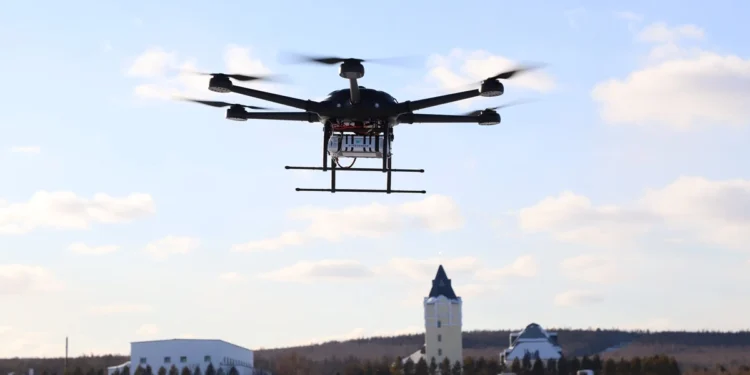According to Global times, a research team from the Dalian Institute of Chemical Physics (DICP) under the Chinese Academy of Sciences has made a major advancement in lithium battery technology, demonstrating its ability to function reliably in extreme cold conditions. The successful test flight of a drone powered by these new batteries at -36°C in Mohe City, Heilongjiang Province marks a significant step toward enhancing aerial operations in extreme environments. The newly developed battery ensures stable energy output, eliminating voltage drops and power failures even in sub-zero temperatures. This innovation paves the way for applications in polar exploration, border patrol, disaster relief, and logistics, where drones must operate under extreme conditions without performance degradation.
Successful Flight Test: Endurance and Stability Under Extreme Cold
During the real-world drone test, the hexacopter maintained stable flight operations, successfully executing rapid start-ups, high-altitude hovering, and complex route navigation despite the freezing conditions. The battery sustained uninterrupted energy flow, fully validating its cold-weather adaptability and reliability throughout the flight.
Traditional lithium batteries struggle in extreme cold due to electrolyte freezing and anode material degradation, leading to power loss and reduced endurance. However, the DICP research team, led by Chen Zhongwei, tackled this challenge by optimizing electrolyte formulations and modifying anode materials to maintain stable power output across a wide temperature range.
Optimized Design: Performance from -40°C to 50°C
The newly developed cold-resistant lithium battery operates efficiently between -40°C and 50°C, making it one of the most versatile energy solutions for aerial and ground applications. In addition, the research team incorporated adaptive thermal management and low-temperature impedance design to minimize performance loss in freezing temperatures.
- At -40°C, the battery’s endurance loss is under 10%, compared to the industry average of 30%-50%.
- This extended operational range allows drones to function without frequent recharging, making them more reliable for missions in high-altitude, frigid regions.
Future Outlook
The success of the test flight demonstrates a major leap in high-performance drone battery technology. As battery-powered drones become more critical in search and rescue, military surveillance, and logistics, this innovation offers a game-changing solution for operations in harsh climates. Looking ahead, the DICP research team plans to further optimize battery performance and expand its use in extreme conditions, ensuring longer flight times, higher efficiency, and greater reliability. This breakthrough represents a significant step toward advancing cold-resistant lithium battery technology, with far-reaching implications across various industries.
With its enhanced energy efficiency, extreme temperature resilience, and extended operational range, this cold-resistant lithium battery technology is set to redefine drone operations in extreme environments, bringing greater efficiency and reliability to critical missions worldwide.
Want to stay updated on the battery industry? Check out the latest news on BatteriesDaily!











